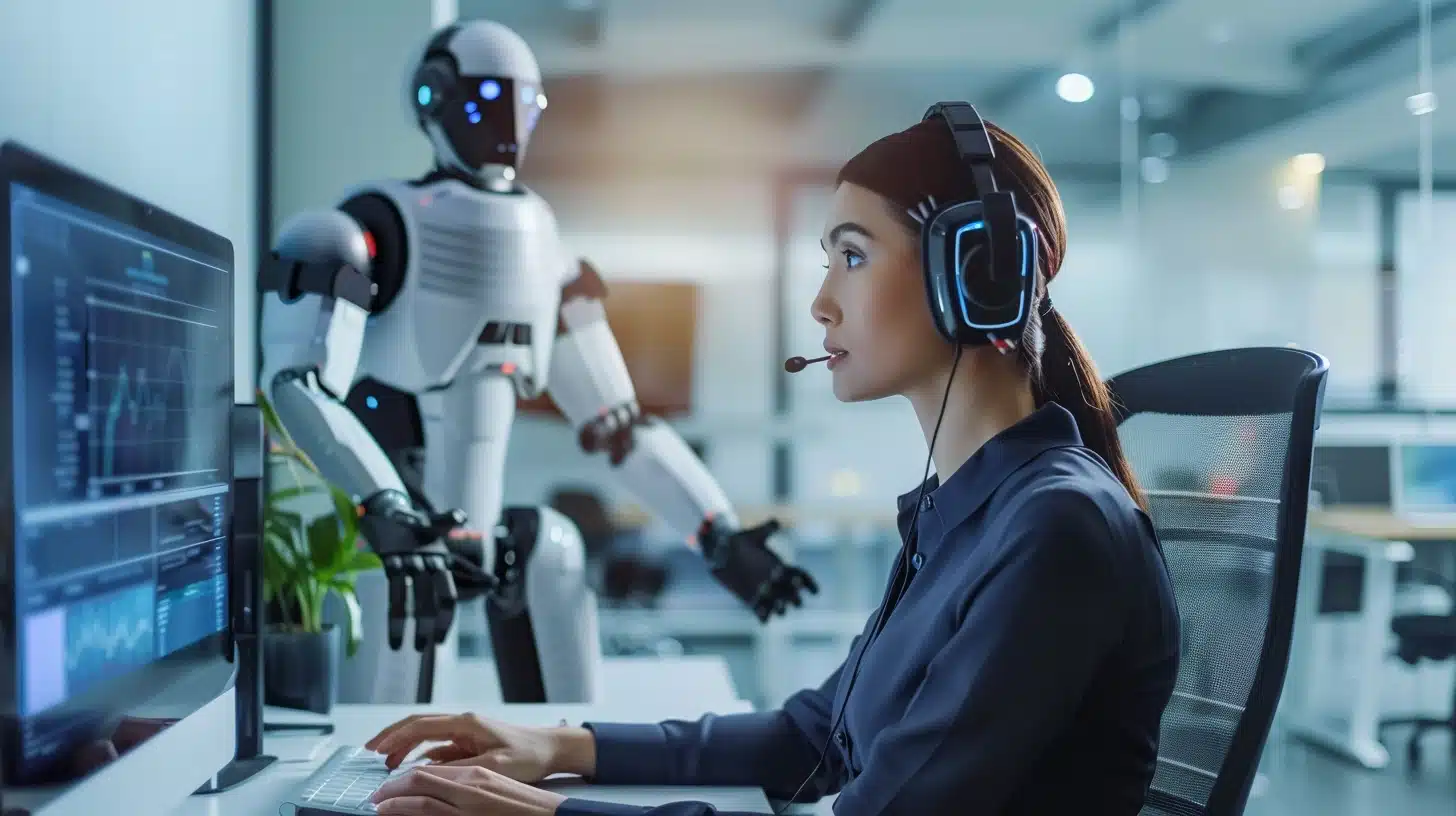Anúncios
Prepare to journey into a not-so-distant future where smartphones become obsolete, replaced by AI-powered personal assistants that cater to our every need. Imagine a world where the concept of typing or swiping on a smartphone becomes an archaic practice. This exciting post will take you into the revolutionary world of AI and how it’s reshaping our day-to-day interactions.
Our lives are steadily being transformed as artificial intelligence evolves, rendering the need for conventional smartphones obsolete. In this futuristic world, AI-powered personal assistants are predicted to be the game-changers. The intent is to streamline our life, making it more efficient and freeing us from the necessity of constant screen time.
Anúncios
In this exploration, we delve deep into how these AI personal assistants operate, highlighting their capabilities far beyond mere voice recognition and command execution. They are being designed to understand, learn, and predict human behavior, thus providing a highly personalized experience.
We will also shed light on the potential repercussions of this technology takeover. As convenience increases, what will be the impact on our privacy, security, and personal interactions? There’s no denying that the AI-powered world promises unparalleled efficiency, but it also brings with it a set of unique challenges that society must be prepared to face.
Anúncios
Don’t let the future catch you by surprise! Stay ahead by diving into the intriguing world of AI-powered personal assistants and understand how they might soon replace the smartphones we know and love. The future isn’t just coming; it’s already here. 🚀🤖
The Revolution of Personal Assistants
Artificial intelligence (AI) technology has revolutionized our daily lives. It has become the backbone of various sectors, from healthcare to transportation. One of the exciting applications of AI is the creation of personal assistants. These aren’t just about Siri, Alexa, or Google Assistant. The AI-powered personal assistants of the future promise to be much more advanced, versatile, and personalized, potentially rendering our current smartphones obsolete.

How AI-Powered Personal Assistants Work
At the heart of these AI personal assistants are machine learning and natural language processing algorithms. These technologies enable the assistants to understand and respond to user commands accurately. In addition, they learn from past interactions, which allows them to better serve their users over time.
- Machine learning: This component enables the assistant to learn from its interactions with the user and make predictions or decisions without being explicitly programmed to perform the task.
- Natural language processing: This allows the assistant to understand and interpret human language, enabling smooth communication between the user and the assistant.
The Implication on Smartphones
Smartphones have become deeply embedded in our daily routines, serving as everything from communication hubs and productivity tools to entertainment centers and personal organizers. Over the past decade, we’ve come to rely on them for virtually every aspect of our digital lives. However, the rise of AI-powered personal assistants may soon challenge this dominance, potentially ushering in a new era where smartphones become secondary to more intuitive, intelligent, and ambient technologies.

AI assistants are evolving beyond voice recognition and command execution. They are being designed to operate proactively, anticipate user needs, and perform complex tasks autonomously. Imagine a world where you no longer need to swipe through dozens of apps or type out messages manually. Instead, your AI assistant—housed in a wearable device, smart glasses, or even embedded in your clothing—could schedule appointments, answer emails, order groceries, and manage your smart home, all without you lifting a finger.
This shift could redefine the very concept of a “personal device.” Instead of a handheld screen, users may interact with a network of connected interfaces powered by a centralized AI assistant that understands their preferences, behaviors, and context in real-time. These systems could use voice, gesture, eye movement, or even neural inputs to facilitate seamless interaction—making the need for a physical phone with a touchscreen increasingly redundant.
Moreover, the ability to sync effortlessly with smart environments—homes, vehicles, workplaces—means the AI assistant can serve you across different contexts without requiring a single screen-bound interface. Notifications, reminders, media playback, and navigation could be projected into your surroundings or delivered through immersive audio, eliminating the interruptions and distractions that come with checking a screen.
This potential shift has profound implications for the smartphone industry. As AI becomes more personalized and pervasive, manufacturers and developers will need to rethink how they design devices, interfaces, and ecosystems. Companies that fail to adapt to this AI-first paradigm risk becoming obsolete, while those who embrace it may lead the next wave of innovation.
Ultimately, AI-powered personal assistants have the potential to not just replace smartphones, but to create an entirely new category of seamless, screen-free digital experiences—redefining how we connect with technology and the world around us.
More than Just Voice Assistants
When most people hear the term “personal assistant,” they think of voice-based tools like Siri, Alexa, or Google Assistant—helpful, yes, but often limited to setting alarms, playing music, or answering simple questions. However, the next generation of AI-powered personal assistants will be far more than glorified voice interfaces. They will evolve into proactive, context-aware digital companions capable of managing complex tasks and seamlessly integrating into nearly every aspect of our daily lives.
These assistants are no longer confined to reacting to voice commands—they’re becoming predictive, intuitive, and deeply personal. Powered by advanced machine learning, natural language processing, and real-time data analytics, they are able to understand not only what you ask, but why you’re asking, and even anticipate your needs before you express them.
Imagine waking up in the morning and your assistant has already analyzed your calendar, traffic data, and sleep quality to suggest the best time to leave for work. It adjusts your smart thermostat to the ideal temperature, recommends a breakfast based on your dietary goals and what’s in your fridge, and provides a personalized news briefing curated from your preferred sources. All of this happens without a single tap on a screen—just seamless, intelligent automation.
One of the most impressive aspects of future personal assistants will be their ability to manage time-consuming or mentally draining tasks on your behalf. Need to book a haircut, reschedule a dentist appointment, or find the best time for a team meeting across different time zones? Your assistant will handle it all—checking availability, making bookings, and updating everyone involved. Thanks to voice synthesis and conversational AI, these assistants can even make phone calls or send emails that sound convincingly human.
But it doesn’t stop at productivity. AI assistants are poised to become personal wellness coaches, mental health aides, and even caretakers. By syncing with wearable health tech or biometric sensors, they can monitor vital signs, encourage hydration and movement, and provide alerts if something seems off. In the future, your assistant might notice irregular sleep patterns, offer breathing exercises, or remind you to take your medication—all based on real-time health data and personalized analytics.
In your home, these assistants will act as a centralized brain for your smart ecosystem. They can control lighting, security systems, entertainment, and appliances, optimizing energy usage or creating the perfect mood with a single command—or none at all, since they can act autonomously based on learned preferences. Heading home from work? Your AI assistant might preheat the oven, turn on the porch light, and queue up your favorite playlist to greet you.
Perhaps most transformative is the social and emotional intelligence these assistants will develop. With sentiment analysis, tone recognition, and emotional AI, they will be able to detect your mood and respond accordingly. Feeling stressed? Your assistant might lower the lights, play soothing music, or suggest a mindfulness break. It will tailor its communication style to suit your personality, becoming less like a device and more like a helpful companion.
In essence, AI-powered personal assistants are evolving from tools into collaborators—digital entities that blend seamlessly into our routines, reduce mental load, and enhance the way we live. They’re not just reactive voice helpers anymore; they are adaptive systems capable of understanding nuance, context, and intent.
This transformation will redefine how we interact with technology—moving from touchscreens and swipes to ambient computing, where the tech fades into the background and the experience takes center stage. As these assistants become more integrated and intelligent, we may no longer need to carry a phone at all. Instead, our digital lives will follow us—intuitively, invisibly, and intelligently.
Challenges and Opportunities
Like any other emerging technology, AI-powered personal assistants come with their own set of challenges and opportunities.
Challenges
One of the significant challenges is privacy. As these assistants become more integrated into our lives, they collect more data about us. This raises concerns about data security and privacy. There’s also the issue of dependence. As these assistants take over more tasks, there’s a risk of becoming overly reliant on them, potentially leading to a lack of self-reliance.
Opportunities
Despite the challenges associated with AI-powered personal assistants—such as privacy concerns and overdependence—the potential benefits are vast and transformative. These assistants have the power to reshape the way we work, live, and interact with technology, offering enhanced convenience, personalization, and accessibility that were previously unimaginable.
One of the most immediate and valuable advantages is productivity enhancement. AI assistants can automate time-consuming, repetitive tasks like scheduling meetings, setting reminders, managing to-do lists, sorting emails, and even handling routine customer service inquiries. This allows users to reclaim valuable time and focus on more meaningful or creative pursuits. In the workplace, AI can streamline workflow management, facilitate collaboration across teams, and provide real-time insights based on project data—boosting overall efficiency.
These assistants also promote personalized user experiences. They learn from daily habits, preferences, and behavior patterns, allowing them to make smarter suggestions—whether it’s recommending the fastest commute route, curating playlists based on mood, or proposing healthier lifestyle changes. As these systems continue to evolve, they’ll become even more attuned to individual needs, creating seamless and intuitive daily interactions.
Another significant opportunity lies in accessibility. AI-powered assistants can be life-changing for individuals with disabilities or age-related limitations. Voice-command interfaces, for instance, eliminate the need for manual interaction with devices, making technology more inclusive. For the visually impaired, AI can read texts aloud, describe images, or provide real-time navigation. For seniors, it can serve as a health monitor, medication reminder, or even a conversational companion to reduce loneliness.
In summary, the integration of AI personal assistants presents an incredible opportunity to enhance quality of life across various dimensions. By handling routine tasks, delivering personalized support, and empowering those with specific needs, these digital aides have the potential to become indispensable allies in our increasingly fast-paced and tech-dependent world.
The Future of AI-Powered Personal Assistants
The future of AI-powered personal assistants is very promising. As technology continues to evolve, these assistants will become more intelligent, versatile, and personalized.

Intelligent
Future AI-powered personal assistants will be smarter. They will be able to learn and adapt to the user’s needs and preferences. They will also be capable of understanding complex commands and delivering precise responses.
Versatile
These assistants will be able to perform a wider range of tasks. From managing our homes to helping us with our work, these assistants will be an integral part of our lives.
Personalized
Personalization will be a key feature of future AI-powered personal assistants. They will be able to understand and cater to the unique needs and preferences of each user, providing a truly personalized experience.
In conclusion, the future of AI-powered personal assistants is indeed exciting. While there are challenges to overcome, the opportunities are endless. So, will we say goodbye to smartphones? Only time will tell. But one thing is for sure – the future is here, and it’s powered by AI.
Conclusion
In conclusion, we are witnessing an innovative shift in technology with the rise of AI-powered personal assistants. As they become more intelligent and efficient, there’s a possibility that they may replace smartphones, which have been our constant companions for over a decade. The future is indeed here and it seems bright with AI personal assistants streamlining our lives, making them more organized and efficient. This technological breakthrough is set to redefine the boundaries of human-machine interaction. However, while the adoption of these AI assistants is inevitable, it is also essential to consider the challenges that come with them such as privacy and security. As we say goodbye to the era of smartphones and usher in the age of AI assistants, we should embrace this change responsibly. This transition is not just about the evolution of technology but also about how we adapt and grow with it. Therefore, whether it’s saying goodbye to smartphones or welcoming AI assistants, the future indeed seems exciting. To stay relevant, we must be open to embracing these changes and exploring the endless possibilities that AI offers.

